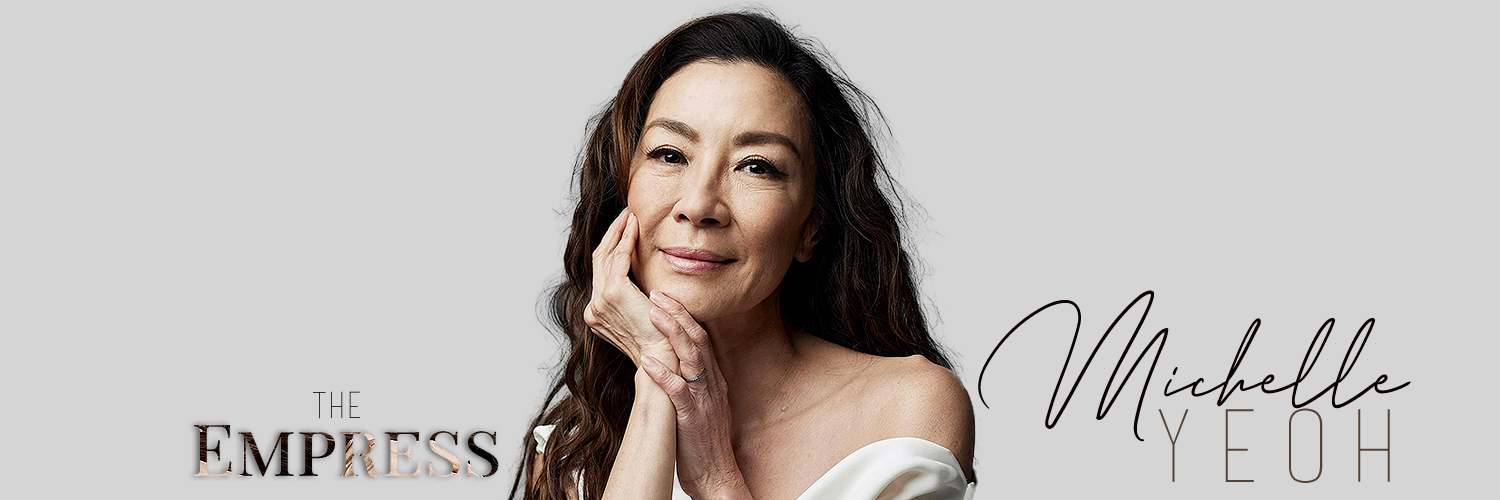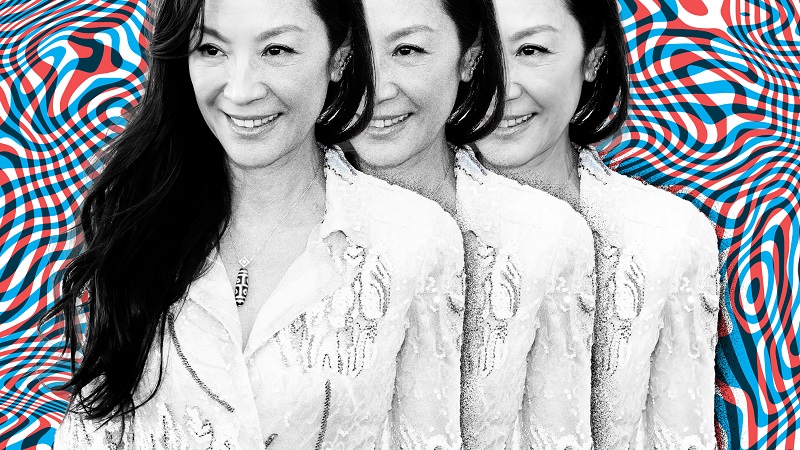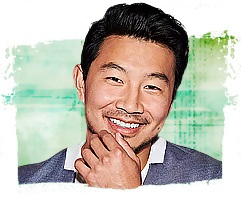
Michelle Yeoh’s Infinite Wisdom: ‘Our Life Is in Our Hands’
Carlos Aguilar
April 16, 2022

Destiny isn’t a fixed lane for the jovial Michelle Yeoh. The Malaysia-born global star best remembered for her performance in the Oscar-winning Crouching Tiger, Hidden Dragon, as a Bond girl in Tomorrow Never Dies, or more recently in the box-office hit Crazy Rich Asians, follows Buddhism and its philosophy of self-determination.
“Our life is in our hands. We are the ones who help create our fate,” she told The Daily Beast. “Whatever we do, if we have a dream, we must work toward that. If one day opportunity presents to you to make that dream come true, are you ready for it?”
Although Yeoh has strived to stay prepared for decades, the entertainment industry, especially in the U.S., has rarely reciprocated with jobs that measure up to her abilities.
In a recent video interview with GQ that went viral, the actress teared up as she considered the unprecedented complexity, physical and dramatic, of her most recent part in the endearingly bonkers and critically acclaimed multiverse stunner Everything Everywhere All at Once.
“The question that I’ve been asking myself for the last like 10, 15, 20 years is why is it that we, I, or so many of us Asian talents have not had a serious lead role in an American movie before? When I got this one, I was very emotional because it was like a sense of relief, honestly,” she said. “I thought, ‘Wow, you do see me.’”
Reuniting after their flatulence-ridden debut Swiss Army Man, uniquely idiosyncratic directing duo Daniel Kwan and Daniel Scheinert, jointly known as Daniels, had initially planned to cast Yeoh in their hyper-ambitious adventure across multiple realities as the wife to their hero, who they envisioned would be played by Jackie Chan. But after considering the storytelling possibilities if they flipped their protagonist’s gender, she became their ideal pick.
Thankful for their confidence in her, Yeoh sees the film as a showcase of the diverse skills she has accrued since her early days in Hong Kong action cinema doing her own stunts. In Everything Everywhere, her on-screen combat agility pairs with the believable poignancy she exudes in quieter scenes of interpersonal conflict.
More importantly, as she puts it, this was a chance to engage with a new generation of young fans who may not be familiar with her storied film résumé thus far.
But before signing on for the Daniels’ maximalist movie, Yeoh met with the filmmakers to ensure they could deliver on their premise. “The script was phenomenal,” she recalled. “But it was one of those that makes you think, ‘Either they’re really insane or they were taking a lot of drugs when they were doing this and they’re not going to be able to follow through.’”
Once vetted for their sincere passion and vision, she asked for a key change to the film’s blueprint. Originally, her character was a fictionalized version of herself with the same name. The prospect of a self-referential narrative didn’t appeal to her. “If we are going to embark on this journey together, the first thing you have to do is take the name ‘Michelle’ off the script, because this is not Michelle Yeoh,” she told the directors.
“As an actor, that’s what you do. You step into all these different universes, different personalities, different lives, and then you have the comfort, the safety of stepping away and enjoying it and then living your own life again,” she said. “When we, as actors, step in all these different shoes, we can only do that if we notice the people around us and we see all these different characters that are real, and that helps us to build the Evelyn Wangs.”
Eager to work with Yeoh, the Daniels were receptive to her request and turned the Michelle on the page into Evelyn Wang. An immigrant laundromat owner facing a major tax audit—with a marriage on the brink of dissolving and a queer daughter who resents her—Evelyn learns that while there are other iterations of herself existing simultaneously, only she can prevent the parallel realms that comprise our universe from collapsing.
“I never want to play myself. I don’t want to be Michelle Yeoh in the movies that I’m participating in because then what’s the fun for my audience or for me? I am an actress, and my job is to create different characters that have a very special voice of their own,” Yeoh explained. “Evelyn represents so many people, so many women, so many mothers, aunties, grandmothers who are real. Their voices need to be heard.”
Underneath the wonderful absurdity and thrilling fight sequences in Everything Everywhere, for Yeoh, the emotional nucleus of this euphoric saga is the multifaceted mother-daughter relationship between Evelyn and Joy (Stephanie Hsu). “They just don’t know how to talk to each other and every time they try it ends up in a fight,” she maintained.
Evelyn represents so many people, so many women, so many mothers, aunties, grandmothers who are real. Their voices need to be heard.
Although most mothers, Evelyn included, will never give up trying to nourish a bond with their young ones, Yeoh believes that their antagonistic approach to expressing their concern, born out of love and care, causes a disconnect difficult to bridge.
“They want you to have a better life. But the only way some mothers feel that you will have a better life is if you are a better, improved version of yourself, when all you want them to do is to, ‘Just take me for what I am,’” she said. “But they think, ‘If you change this, whether it’s your hairstyle or go to the best school, then you will be so successful in life.’”
Yeoh isn’t a stranger at playing a matriarch with strict expectations of their children. And it’s something she’s recognized in her own upbringing.
“In Crazy Rich Asians I loved playing the mother because it’s so relatable to all of us women. I have a mother who loves me to death, but maybe I don’t see her for months on end and then the first thing she’ll say to me is, ‘Why are you so tan?’ Or ‘Why are you so skinny?’ And then you go, ‘Okay… I love you too, mom.’ [Laughs]. The mother-daughter relationship has always been full of contradictions,” Yeoh noted.
In turn, Yeoh believes, sometimes young people, out of sheer frustration with the lack of meaningful and mutually respectful communication, resort to wounding language or actions. “They think, ‘Now you can feel the hurt that I’m feeling when you don’t let me be who I want to be,’” she explained. Wise in her assessment of how to heal, Yeoh thinks the only viable pathway is to hear what the other feels without imposing one’s moral values.
“That is so hard to bridge if both sides don’t take a step back and say, ‘I have to not let my ego, my pride get in the way and say, ‘I won’t judge,” Yeoh said. “One of the things that we find most difficult is to not be judgmental. ‘Let’s agree there’s no right or wrong. Can we just have a conversation?’ That’s what we need more of, not just between mothers and daughters, husbands and wives, and even friends or what you think are enemies. If we don’t have a conversation, there will always be this big unbreakable barrier.”
Thinking about the woman that raised her, the perpetually gracious Yeoh feels certain that, if given the space to develop her talent, her mother, Janet Yeoh, would have excelled in the performing arts. “My mother would have been one of the greatest actresses around if she had had the opportunity, she really is made for this,” she said. “She’s still 100 percent supportive of what I do, but she would’ve been so much better at it.” [Laughs]
Sincere modesty notwithstanding, what enticed Yeoh to the Daniels’ Everything Everywhere boils down to the tricky feat that the tonally eclectic plot required of her. Seldom has she been more stunningly magnetic than as Evelyn. In the high-octane heroine with a precarious home life, Yeoh found an invigorating new challenge.
“What’s the point if you go in thinking, ‘Oh well, just another day. Nothing interesting, nothing exciting, nothing to surprise you.’ That would be very sad. One thing I’ve always centered my life around is that every day is a new learning experience. That gives me the joy of waking up in the morning thinking, ‘What am I going to discover out there today?’”
Yeoh cherishes the unpredictability of our numbered days and carries herself with the conviction that even the tiniest decisions could have a major impact. “Sometimes just the decision to go out the door might just happen on a chance meeting with someone,” she said. And when those turns of self-made fate turn into missteps, as it naturally does, she processes them as knowledge acquisition.
One thing I’ve always centered my life around is that every day is a new learning experience. That gives me the joy of waking up in the morning thinking, ‘What am I going to discover out there today?’
“Life is about disappointments. Life is about failures. We make mistakes because guess what? We’re human beings. It’s not a perfect life, but every failure, every mistake you can turn into a good lesson and move forward. When I hurt my back very badly, I thought, ‘That’s it. You’re not going to be able to be doing physical dancing for eight hours a day.’”
She’s referring to a spinal injury that at a young age prevented her from pursuing dancing professionally—a setback that put her on a different trajectory and led her to where she is today. Fortunately, Yeoh had a mentor, the principal of her school, that put things into perspective. “You can’t dance for eight hours, but later on, when you are stronger, you can dance for two or four hours,” he said, telling her to clear her then-fatalistic mindset.
“At that moment, when you are young and vulnerable, your world collapses, but then you pick yourself up and you go, ‘I hear what wise people are saying to me and I will open my eyes and my heart and say, ‘I will let other things in,’” she explained. “That’s how you move forward. You discover new journeys and new doors that are being opened.”
The recent press tour for Everything Everywhere, which began at the SXSW Film Festival in March, and the many profiles that have chronicled her decades-long journey as a bona fide cinema icon, have sparked reflection on what’s behind her. But Yeoh, whose forward-thinking ideology prioritizes what’s to come rather than dwelling on the past, reminisces with caution so as to not let nostalgia blind her.
In-depth pieces about her passage from doing her own stunts in an array of Asian productions to garnering Western attention in the late ’90s and early 2000s often focus on the bodily pain she endured. Those moments she dislikes remembering “because unfortunately some of them still linger with you, and don’t go away.”
That doesn’t mean Yeoh’s totally averse to occasionally reveling in the joys of her glory days. “There are great memories and that’s what life is made of. I love meeting up with old friends and sitting there with a huge glass of wine talking about good old times,” she said. What matters, however, is to remain grounded in the present, to meet new people, make new creative families, and to enjoy moving on to a new chapter.
“One thing that I don’t do so much of is think, ‘I wish I could have done that at that time.’ I don’t wish about what I could have or would’ve done,” Yeoh offered.
“The now is much more important because this will dictate what is going to happen to me next. I have so much to be grateful for. Why would I waste time wishing for something I could have had instead of appreciating what is in front of me? You learn to do that as time goes by because you realize you are born then you age, and you die. You better appreciate the time that is here for you now, because very soon it just goes away.”









